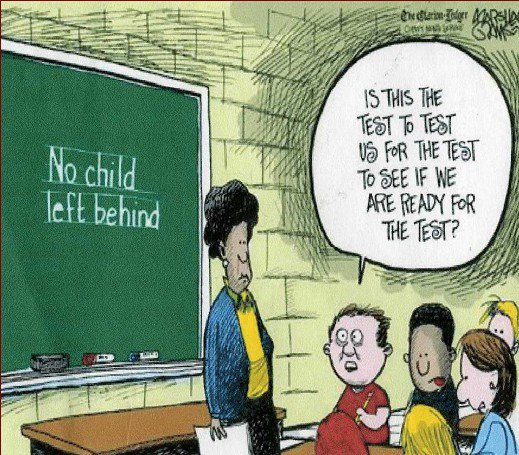 Everyone connected with education knows that No Child left Behind has changed the world od education dramatically. Some say for better, others say for the worse. What we do know is that there is more strain on principals and teachers than ever before to meet the goals of this initiative. Even now, there is movement underway to try and modify this initiative to improve the ways in which it affects the education of our children.
Everyone connected with education knows that No Child left Behind has changed the world od education dramatically. Some say for better, others say for the worse. What we do know is that there is more strain on principals and teachers than ever before to meet the goals of this initiative. Even now, there is movement underway to try and modify this initiative to improve the ways in which it affects the education of our children.
And thankfully so!
We speak to education professionals everyday, all across the country, and we have seen the strains. More important, we have seen what has happened to the way children spend their days in school. There is so much pressure now on so many districts that an enormous amount of time is now spent on nothing but preparing for tests. “Teaching to the test” has become a watchword in many areas. And it is sad. Sad because, although well meaning, No Child Left Behind fails to take into account that schools are not businesses and cannot be run like businesses. Good teaching has far more in common with art than with the assembly line. Children learn in many different ways.
I was performing as Lincoln in front of a group of primary aged children once and there was a kindergarten aged boy in the front row who, through out the program, appeared not to be paying attention. He simply stared at his shoes and constantly played with the Velcro. I assumed he was in another world, and tried to avoid being distracted by the incessant noise of his velcro antics. But at the end of the program, when I asked for questions, his hand went straight up and he offered a series of quite astute questions, totally unexpected from a child that age. To my total surprise, he had been listening indeed, throughout, and quite keenly at that! He just did not listen the same way as other kids. We are all different and we all learn in different ways.
So it is that we ply our trade, seeking every day to please schools seeking school assembly ideas, and trying to reach children in ways regular classroom instruction simply cannot.
Take the Sky Dome Planetarium as an example. This mobile planetarium travels all over the country offering schools the opportunity to introduce students to astronomy in a manner quite impossible for most otherwise. A portable planetarium, complete with a state of the art digital star projector, provides a wow factor for kids. I wrote on another occasion about a student out east somewhere who never spoke in school. Never, that is, until he was present in a performance of our mobile planetarium. He began to not only speak but to utter a series of amazing comments and questions. His teachers were stunned, quite literally. We were not. School assemblies can provide a magic in the school day that can, and often does, break through the ordinary and allows kids to experience something breathtakingly awesome.
So, break through the perceived limits of “time on task”. Seek out assembly ideas that will provoke a breakthrough for your kids. School assembly ideas are not just about entertainment, or a break from routine. School assemblies are, or should be, an integral part of the education of every child.
Geoff Beauchamp is the Regional Manager of Mobile Ed Productions where "Education Through Entertainment" has been the guiding principal since 1979. Mobile Ed Productions produces and markets quality educational school assembly programs in the fields of science, history, writing, astronomy, natural science, mathematics, character issues and a variety of other curriculum based areas. In addition, Mr. Beauchamp is a professional actor with 30 years of experience in film, television and on stage. He created and still performs occasionally in Mobile Ed's THE LIVING LINCOLN.






